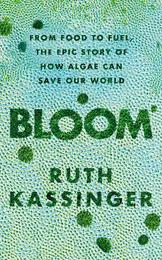
|
Bloom: From Food to Fuel, The Epic Story of How Algae Can Save Our World
Hardback
Main Details
| Title |
Bloom: From Food to Fuel, The Epic Story of How Algae Can Save Our World
|
| Authors and Contributors |
By (author) Ruth Kassinger
|
| Physical Properties |
| Format:Hardback | | Pages:416 | | Dimensions(mm): Height 275,Width 210 |
|
| Category/Genre | Popular science
The environment
Pollution and threats to the environment |
|---|
| ISBN/Barcode |
9781783964413
|
| Classifications | Dewey:579.8 |
|---|
| Audience | |
|---|
|
Publishing Details |
| Publisher |
Elliott & Thompson Limited
|
| Imprint |
Elliott & Thompson Limited
|
| Publication Date |
4 July 2019 |
| Publication Country |
United Kingdom
|
Description
Say "algae" and most people think of pond scum. What they don't know is that without algae, none of us would exist. There are as many algae on earth as stars in the universe, and they have been essential to life on our planet for aeons. Algae created our oxygen-rich atmosphere, abundant oceans and coral reefs. Crude oil is made of dead algae, and algae are the ancestors of all plants. Today, seaweed production is a multi-billion-dollar industry, with algae hard at work to make your sushi, chocolate milk, beer, paint, toothpaste, shampoo and so much more. Delving into science and history, in this revelatory book Ruth Kassinger takes readers on an around-the-world, behind-the-scenes, and into-the-kitchen tour. We'll meet the algae innovators working towards a sustainable future: from seaweed farmers in South Korea, to scientists using it to clean the dead zones in our waterways, to the entrepreneurs fighting to bring algae fuel and plastics to market. Whether you thought algae was just the gunk in your fish tank or you eat seaweed with your porridge, Bloom will overturn everything you thought you knew about these little green cells and the immense power that they hold. This could be the future of our rapidly changing world.
Author Biography
Ruth Kassinger is the author of Paradise Under Glass and A Garden of Marvels, as well as a number of award-winning science and history books for young adults. She has written for the Washington Post, the Chicago Tribune, Health magazine, National Geographic Explorer, and other publications. She is a frequent speaker at conservatories, arboretums and garden clubs, and has been featured on radio shows and Voice of America.
Reviews"Truly mind expanding ... science writing at its most engaging and rewarding" -- Tonto Williams, Electronic Scrapbook; "Algae are among the earth's oldest life-forms, pervasive in everything from pond scum to crude oil. Kassinger explains their history and biology, and makes a persuasive case for their future importance." -New York Times Book Review; "Gives a distinct view into these underappreciated organisms and demonstrates our intertwined history with algae. Hopefully, it will help readers see algae in a different light." - Science Magazine; "Fascinating and relevant...As Kassinger finds unique nuggets within algae's backstory and possible future, she unravels amazing, microscopic details of this vital resource...Where it gets really interesting is her detailed explanation of the large role algae played in the complicated, multistep process of human evolution, supplementing our ancestors' diets with iodine and the omega-3 oil DHA (docosahexaenoic acid), both essential ingredients for developing larger brains. And it has continued to serve as a nutritious food source for many cultures ever since...Kassinger has penned a wondrous story of this multifaceted, often misunderstood microorganism whose existence is vital to our own." -BookPage, starred review; "We often look for big solutions, but the reality is that the smallest things often offer hope. This globetrotting book showcases the 'algae innovators' (the phrase of the month) exploring what we can learn from these often-ignored plants." -EcoWatch; "Deep and enlightening...Readers will learn more about algae than they ever imagined (and relish every minute of it). Comparisons to Mary Roach and Susan Orlean are well-deserved, and Kassinger's erudite and wide-ranging approach should entice readers with a wide range of interests, from food to fashion, bioengineering, marine biology, farming, and general fascination with the wonders of nature. Gardeners will welcome Kassinger's latest, and everyone else will feel lucky to discover this winsome writer." -Booklist, starred review; "A fun and fascinating deep dive into the natural history, current uses, and vast potential of algae...Accessible and enthralling...Kassinger delivers the powerful and optimistic message that slime just may be our savior...Thorough but not dense, informative but never boring-a delight from start to finish." -Kirkus, starred review; "In chirpy prose chock-full of homespun metaphors...Kassinger turns an obscure subject into delightful reading...Even readers who never expected to enjoy a book about slime will find this an informative and charming primer to 'the world's most powerful engines.'" -Publishers Weekly; "Compelling ... there is something for everyone, from committed phycologists to people who hitherto (but hopefully no longer) regarded algae as an inconvenience or worse. Blanket weed may never seem the same again" -- Nature; "With brio and great wisdom, Ruth Kassinger demonstrates how the apparently humble and often disregarded algae ("pond scum") are actually amongst the major engines of life on our planet. Bloom is a classic of our environmental crisis, alongside books such as Elizabeth Kolbert's The Sixth Extinction." - Peter Forbes, author of The Gecko's Foot; "A book full of delights and surprises . . . This is a beautiful evocation of the many ways that our past and future are entangled in their emerald strands" - David George Haskell, author of Pulitzer Prize-finalist The Forest Unseen; "Ruth Kassinger is a witty and affable guide throughout this globetrotting celebration of an overlooked life form" - Thor Hanson, author of Buzz, The Triumph of Seeds and Feathers; 'Engaging and deeply informative' - Elizabeth Kolbert, author of The Sixth Extinction: An Unnatural History
|